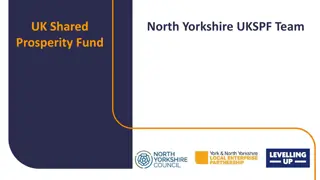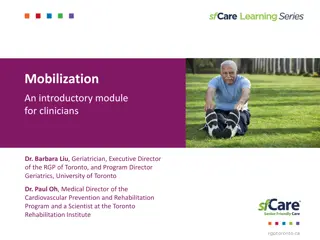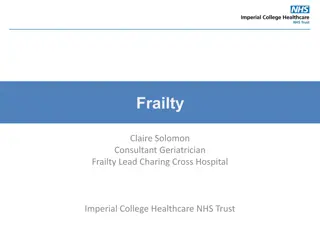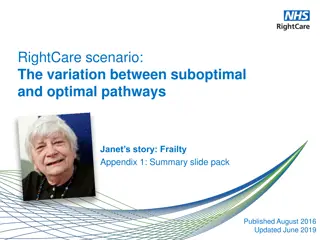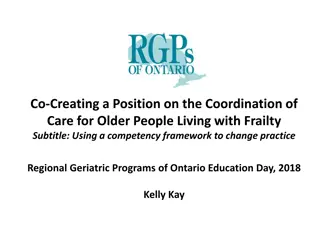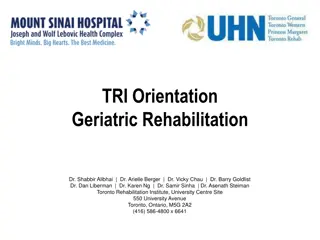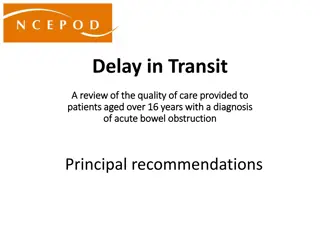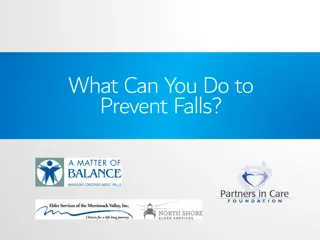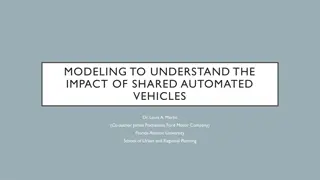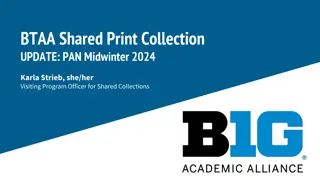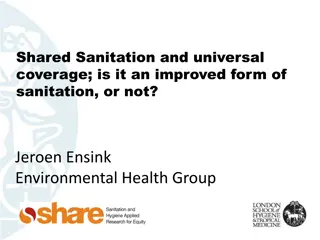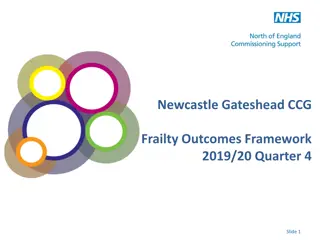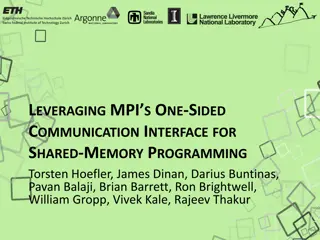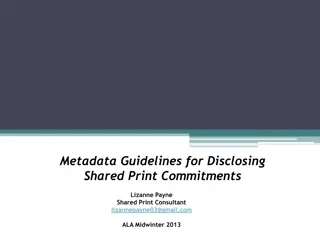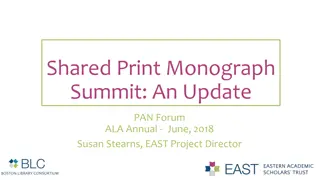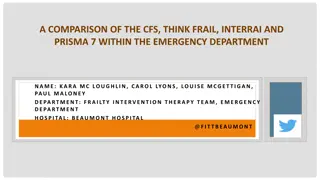Community Offer for Frailty Management: Building a Shared Understanding
This project focuses on developing a shared understanding of community offers for different scales of frailty, aiming to encourage the adoption of a common language using the Clinical Frailty Scale Rockwood Score framework. Through collaboration with health, social care, and community partners, the project identifies how community activities and organizations can contribute to individual well-being at various frailty score levels. The initiative involves multiple stakeholders and aims to embed understanding across the system, emphasizing the importance of communities in improving health and well-being.
Download Presentation

Please find below an Image/Link to download the presentation.
The content on the website is provided AS IS for your information and personal use only. It may not be sold, licensed, or shared on other websites without obtaining consent from the author. Download presentation by click this link. If you encounter any issues during the download, it is possible that the publisher has removed the file from their server.
E N D
Presentation Transcript
Developing a shared understanding of the wider community offer for different scales of frailty. Liz Meade Stronger Communities Delivery Manager, NYCC Project Overview December 2022 OFFICIAL - SENSITIVE
Clinical Frailty Scale Rockwood Score The intention is that this piece of work will encourage the adoption of a shared language using the framework this frailty scale provides across health, social care and community partners. The intention of the task & finish group was to indicate to those who use the assessment which community activities and organisations can contribute to increasing an individuals wellbeing at the different score levels. Conversely this will also provide information for those providing community activities /leading VCS organisations which support/provision is most relevant and when. Thus embedding understanding across the system. OFFICIAL - SENSITIVE
This project was identified as an action at a series of Systems Leadership sessions commissioned for Harrogate and Rural Alliance (HARA) & Voluntary Sector partners facilitated by Francis Storr. The following Task and finish group was convened; Liz Meade (Project lead) Delivery Manager, NYCC Stronger Communities Team Alison Brittain Team Manager, NYCC Health & Adult Services Dawn Bowness - Senior Improvement Manager Fragility & Integration, North Yorkshire CCG Helen Flynn Executive Director, Nidderdale Plus Community Hub Jane Farquaharson Chief Executive Officer, Cliff House Community Support Services Linda White Harrogate Team Manager, NYCC Living Well/ Social prescribing Link workers Helen Sams Service Development Officer, NYCC Commissioning & Quality Sam Haward Head of Community Services and Integration, North Yorkshire Place ICB North Yorkshire Sport also contributed. OFFICIAL - SENSITIVE
Why is this important ? There is now widespread recognition that communities have a vital role in improving health and wellbeing. There are a number of (overlapping) reasons for this, including the following. The communities people are born, live, work and socialise in have a significant influence on how healthy they are. Although estimates vary about how much influence, these factors have a much greater influence on health and wellbeing than health services. For example, we know that, under certain circumstances, social isolation and loneliness can be as bad for health as risk factors such as smoking. There are many assets within communities, such as skills and knowledge, that can be mobilised to promote health and wellbeing. From a health care perspective, communities have great insight and intelligence on what they need from health services, and on what works in improving health. Linked to this, directly engaging people from the most marginalised groups and those most likely to be affected by health inequalities is important in addressing these inequalities through both formal health services and other means. Source: Communities and health | The King's Fund (kingsfund.org.uk) Updated 5 May 2021 OFFICIAL - SENSITIVE
Who is this tool intended for ? Health & Social Care Teams Primary Care Community Groups Voluntary organisation/Social enterprise management teams. The original focus was on the HARA geographic area, increased interest in the tool kit from colleagues in the ICS has increased the reach to cover the whole of North Yorkshire. OFFICIAL - SENSITIVE
The Rockwood Frailty Scale gives a definition of 9 degrees of frailty, from Very Fit to Terminally ill. OFFICIAL - SENSITIVE
The following slides share the information developed by the Task & Finish Group OFFICIAL - SENSITIVE
Information on wider community support Rockwood Score Types of wider community support available/relevant Example Managing well levels 1 - 3 This will include area specific key sources of information, to enable independent access to community facilities, activities & services with a focus on promoting the Five ways to wellbeing . Welcome to NY Connect | NY Connect (northyorkshireconnect.org.uk) Libraries | North Yorkshire County Council Adult education and training courses | North Yorkshire County Council Volunteering In North Yorkshire - Community First Yorkshire Community Facebook pages Community Centre noticeboards Asking friends, family & neighbours General community activities Fitness classes Promotion of volunteering Promotion of physically active volunteering Digital skills support Peer support groups Organisations that offer social activities such as Men s Sheds, luncheon clubs OFFICIAL - SENSITIVE
Rockwood Score Example Types of wider community support available/relevant Milder frailty levels 4 - 5 This will include area specific information on services & activities, providers will be known to NYCC and or ICB. It is recognised that the majority of individuals will need signposting/referring, some may need active support to enable them to engage. Home - Go Local North Yorkshire (golocal- northyorks.community) Community Transport Organisations providing assisted shopping Welfare checks Befriending opportunities Meal delivery services Carers sitting services Peer support groups Condition specific activities OFFICIAL - SENSITIVE
Rockwood Score Types of wider community support available/relevant Example Moderate - severe frailty levels 6 9 This will include area specific information on Voluntary and Community sector organisations known to NYCC and/or the ICS who are able to offer specialist support. Individuals will need referring and support whilst engaging in these community activities and services. Community Transport Support Organisations offering one to one support Adapted exercise at home programmes Family/carer support Important to maintain pre-existing relationships to maintain social connections Welcome to Dementia Forward, Dementia Forward, North Yorkshire's leading dementia charity OFFICIAL - SENSITIVE
The tool kit will have information for each level example of content OFFICIAL - SENSITIVE
Important contributory factors: Important contributory factors: Importance of an asset based approach, how can the individual contribute to the wider community Importance of person being connected with their wider community from Rockwood scores 1-3 as this leads to lasting relationships that can offer support as the person becomes more frail. Importance of digital skills - introducing technological solutions at higher score levels may be difficult if the person doesn t feel confident/comfortable in using digital equipment. Importance of appropriate referral/signposting to Community & voluntary organisations and ongoing sharing of relevant information as appropriate and needed. Community groups & organisations with appropriate support and training could remain engaged with the person as their needs increase. Important the wider system considers how these voluntary and community sector organisations are appropriately supported to cover there costs. The person may need to access physical activity programmes (home based dependant on ability) to enable person to stay connected to others. For example exercises that help a person get in and out of a car. It is considered that this piece of work is also relevant for those outside of the evidenced based age range and the approach could also be used for other scales such as Mental Health. OFFICIAL - SENSITIVE
The toolkit will be officially launched in January 2023 and be accessed via the NYCC website. Stronger communities | North Yorkshire County Council This is an initial version, users will be able to comment on its usability and potential by emailing stronger.communities@northyorks.gov.uk The content of the toolkit will be reviewed in April 2023. OFFICIAL - SENSITIVE
Comments & Questions Liz Meade Stronger Communities Delivery Manager North Yorkshire County Council Liz.Meade@northyorks.gov.uk OFFICIAL - SENSITIVE


